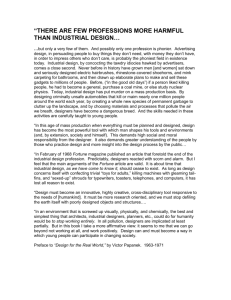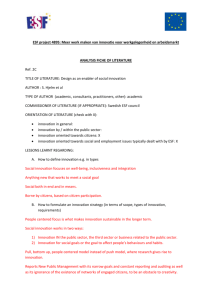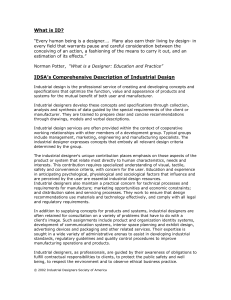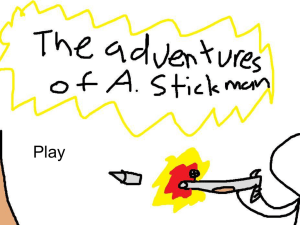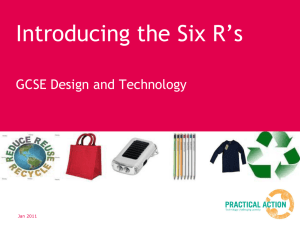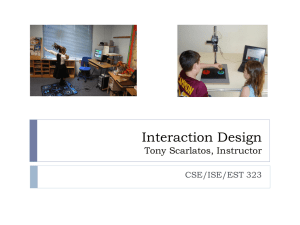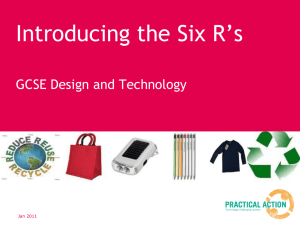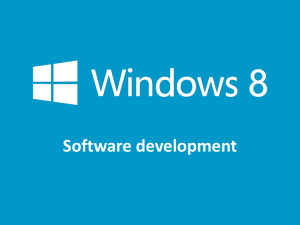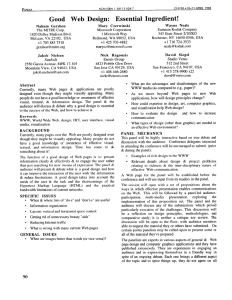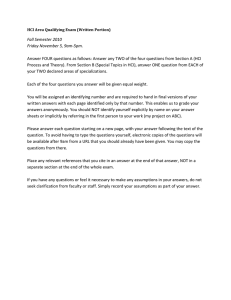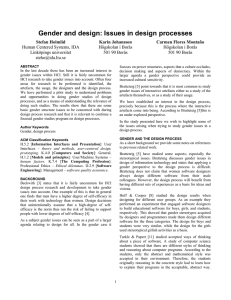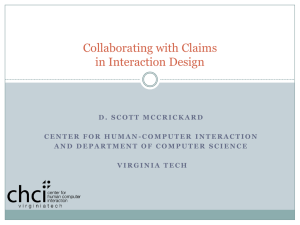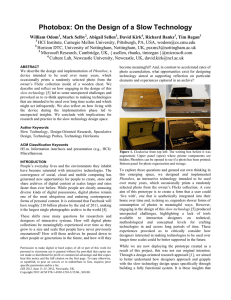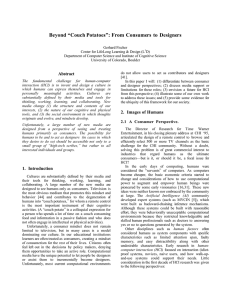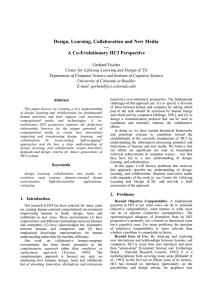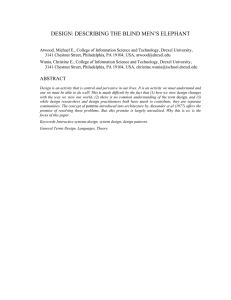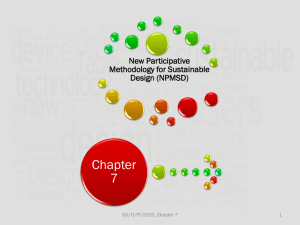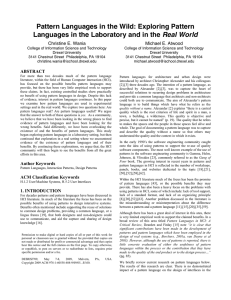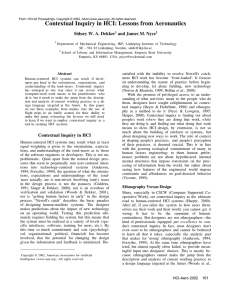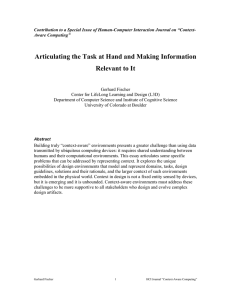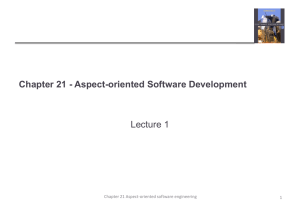Software Design and Architecture - University of California, Irvine
advertisement
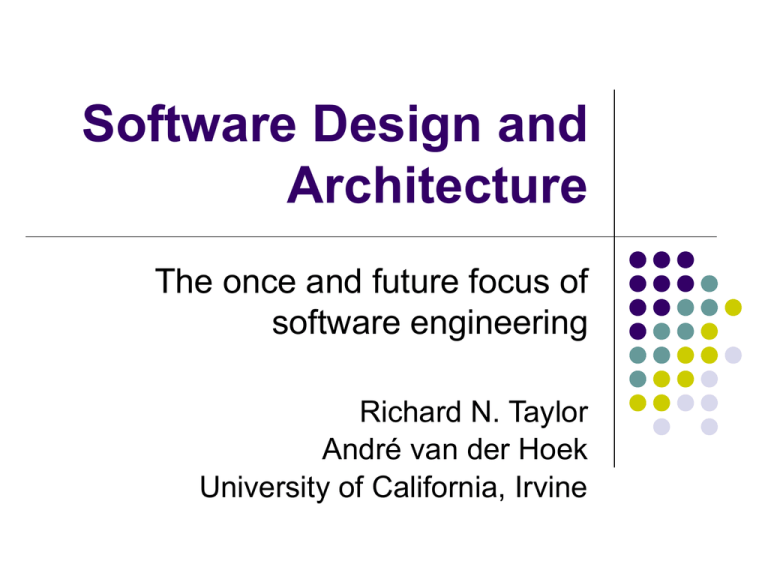
Software Design and Architecture The once and future focus of software engineering Richard N. Taylor André van der Hoek University of California, Irvine Structure of the “Future of Software Engineering 2007” Paper Introduction Paradigms and Persuasions: How design has been approached Prescriptive design methods, Notations, The wisdom of experience, HCI design, Design outside of software, Cognitive and social strategies Contemporary Currents Agile methods, Aspect-oriented design, Design analysis, Componentbased design, Software architecture Design, Designing, and Designers The elements of design research, The community of designers Research Directions Directions reflecting good recent progress, Directions from new capabilities, Directions from design imperatives, Directions from examining our past, Directions from looking outside of CS, Barriers to progress Challenges and Vision Technical challenges, Community challenges, A vision for the long future Structure of the Lecture 1. 2. 3. 4. What does the subtitle mean? Design of what? Just what is Design? The “long future” of (software) design Hic jacet Arturus, rex quondam, rexque futurus Geoffrey of Monmouth, 12th century Design is at the Center of SE Design Will Remain the Center Consequences We can always stay gainfully employed! Design provides a guiding star for Our educational practices Our research emphases Essence v. accident: as we center on the former, design becomes pre-eminent Our characterization of what we do to outside parties Design will remain as a worthy subject of study Design of What? Past and current software design research Point: almost all are focused on structure of software Design in other disciplines (automotive, architectural, fashion, consumer products) Prescriptive design methods, Notations, The wisdom of experience, HCI design, Design outside of software, Cognitive and social strategies Agile methods, Aspect-oriented design, Design analysis, Componentbased design, Software architecture at least as much emphasis on appearance and behavior -- perhaps more so. We need to focus on design of structure and appearance and behavior Application Design v. Software Design Is this a false dichotomy? The software engineering literature seems pretty one-sided… Is it just HCI v. software design? What issue predominates in the following: An airline reservation website Mashups (dynamically composed web apps) GoogleEarth If it is not our job to design applications, who’s job is it? When Does Design Happen? Simple test: When is the user interface to an application designed in your favorite software process? A problem: we still speak of “requirements, then design”. But design is being done in “requirements” -- much of the time. But if you don’t treat it as design you’ll likely do a poor job of it Kudos to the agile movement for the right focus here. Where Did We Go Wrong? First, a little test from Math class: One Student’s Answer…. Find Design [From W. Royce’s 1970 paper] Find Design Or Here? [From W. Royce’s 1970 paper] Or Here? This Early Work Misled Us When one thing is labeled “Design” or “Preliminary Design” that implies that those things that are NOT so labeled are NOT design Especially when some of those other things are indicated as predecessors of Design Requirements Engineering Involves Designing Just What is Design? Design as Decision Making Decisions of how to accomplish something Decisions of how to represent something A solid approach to design should offer a solid approach to decision making What are they? Capturing them, and their rationale Recognizing them when they are made, in the context Analyzing, contrasting, and managing alternatives Reflecting upon them to improve future designs (future decision making) Distilling them into practical, reusable design knowledge Decision Makers: Who are the Designers? The software engineers The “software designers” The “requirements engineers” The “implementers” The product/business strategist/analyst Domain experts Example: product-line architectures Decision Making: When Does it Happen? You guessed it: Throughout a system’s lifetime Conception Detailed architecture Implementation (think of the impact of choosing an implementation framework) Adaptation Why does this matter? Because these decisions matter -- and should be treated with equivalent care and be part of the design documentary A Design Imperative What’s key in making explicit software structural design essential, credible -- and not busy work: a full, critical tie to implementation. Works in low-level (structural) design (UML) Works in generative approaches to system design/implementation We must make it work more broadly. Research Directions Grab Bag Never underestimate the power of brute force “GoogleDesign” Search over diagrams, structures, constraints Leverage technology Networking: the collaboration enabler Displays (Stop worrying about optimization) The Long Future Co-design of software and organizations Software designers as the skilled designers of other intangible products The driving experience Commerce Law Conclusions What’s the deal with the subtitle? 1. l Design is the central focus of software engineering Design of what? 2. l We design structure and appearance and behavior, and do it throughout Just what is Design? 3. l Designing involves decision-making by more than just software engineers -- and requires support Acknowledgments National Science Foundation Grants 0438996 and 0536203 Nenad Medvidovic and Eric Dashofy Lee Osterweil, Peter Freeman, Alex Baker, Michael Gorlick, Peyman Oreizy, David Redmiles, Alex Wolf Chuck Pelly, DesignWorks USA Software Architecture The set of principal design decisions about a system Design decisions can encompass every aspect of the system under development, including: design decisions related to system structure – for example, “the architectural elements should be organized and composed exactly like this”, design decisions related to behavior – for example, “data processing, storage, and visualization will be handled separately”, design decisions related to interaction – for example, “communication among all system elements will occur only using event notifications”, and design decisions related to the system’s non-functional properties – for example, “the system’s dependability will be ensured by replicated processing modules.” Design decisions can exist across the spectrum of detail. Stakeholders determine what is principal Turbine Visualization of Processes Assess/… Test/Build/ Deploy Build/Design/ Requirements/Test Design/Build/ Requirements Requirements/Architecture assessment/Planning The Science of Design Design Sciences (e.g. Software design) Engineering Descriptive Sciences (e.g. Biology, Astronomy)
